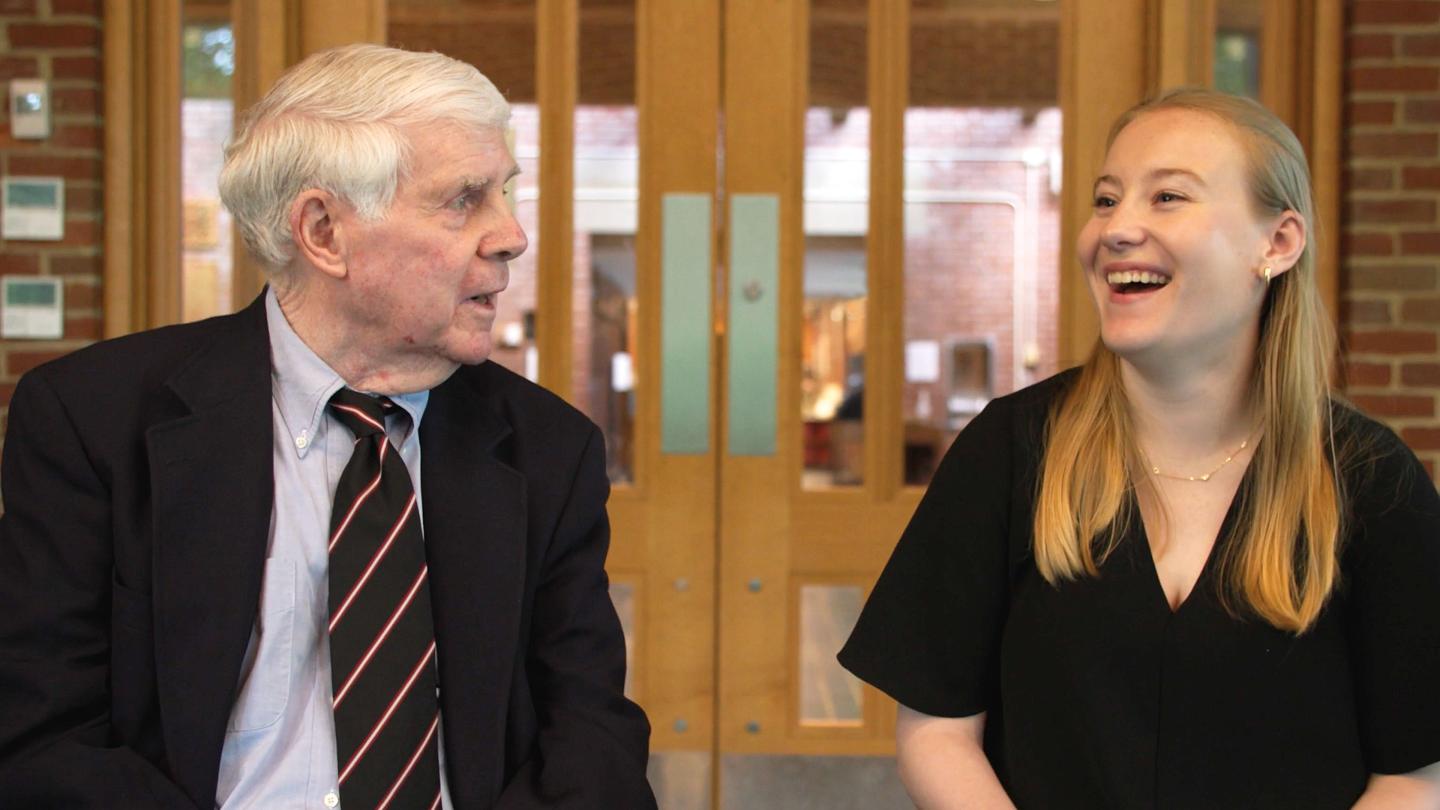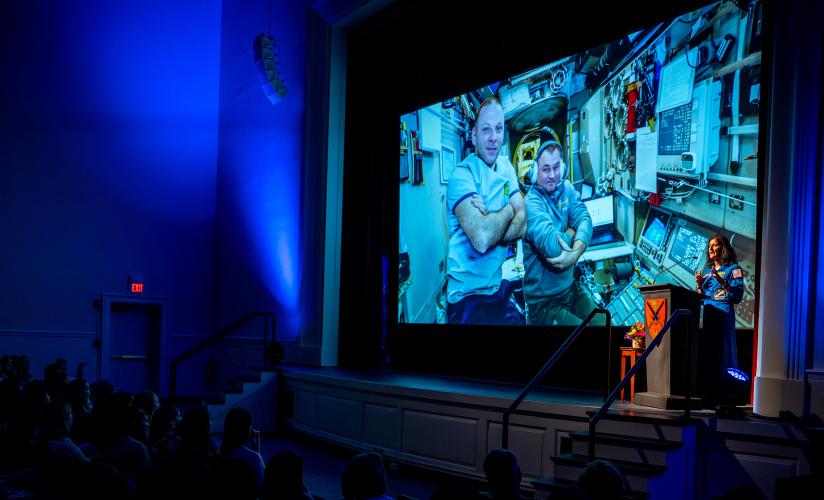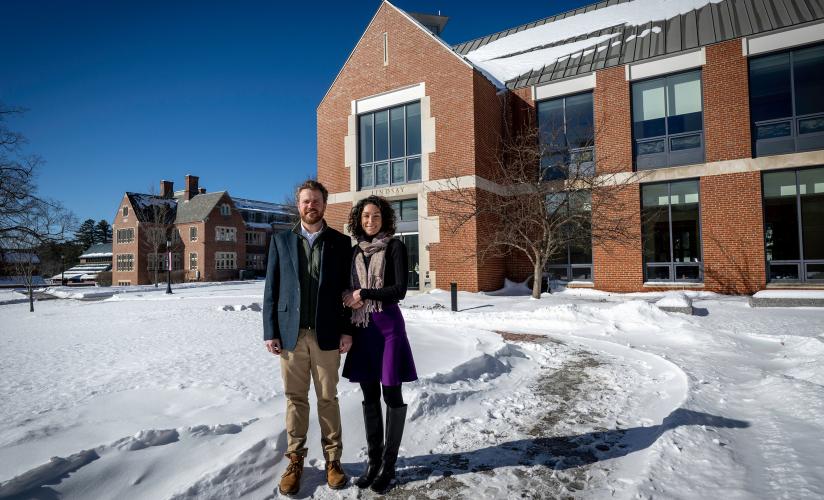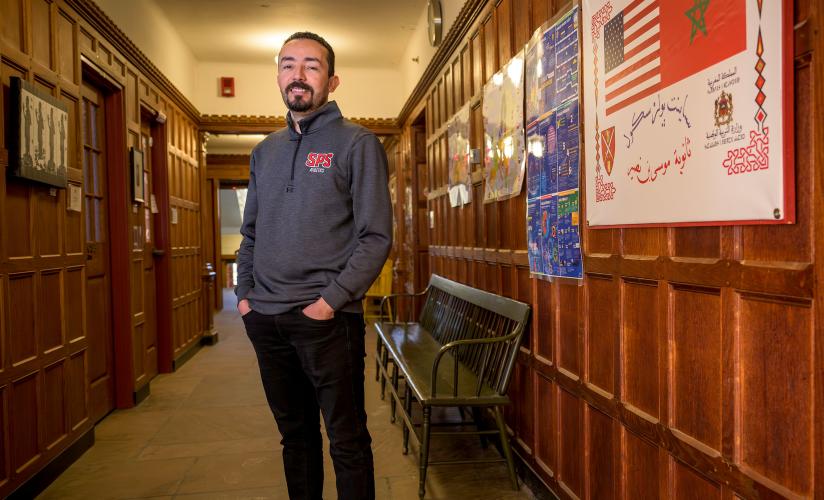

A conversation with SPS Form Directors Porter Hopkins ’48 and Haley Fuller ’18.
BY KRISTIN DUISBERG
During the years C. A. Porter Hopkins ’48 attended St. Paul’s School, horses pulled plows to clear the snow from Lower School Pond, and there was no team for the Baltimore native’s favorite sport — lacrosse. Boys from the First to Sixth Forms would queue up at the Tuck Shop, in the Big Study, to telephone their families, and sent their clothes home in cardboard boxes to be washed, pressed and returned. For the four years Haley Fuller ’18 spent in Millville, cell phones were ubiquitous — but so were students’ reminders to one another to look up and greet each other as they walked the paths. A competitive figure skater at home in Connecticut, Fuller switched to hockey skates as a member of the SPS girls JV hockey team, and discovered her passion for journalism, even though publication of The Pelican — the student newspaper Hopkins helped launch in 1946 — was limited during her student years.
Having graduated from St. Paul’s 70 years apart, Hopkins, a retired state senator from Maryland, and Fuller, who had to cut her Anniversary visit to Millville short to receive her master’s in journalism from Northwestern on Sunday, June 11, in many respects attended very different schools. But when the two form directors representing the oldest and youngest reunion forms sat down together at the beginning of Anniversary Weekend, they also found at least a little common ground.
HOPKINS: My older brother [Luke ’46] came to St. Paul’s School first. I grew up spending my summers in Maine, on a beautiful cove in Mount Desert called Gilpatrick Cove. And when the tide was up and it wasn’t rough or blowing too hard, a wonderful old gentleman would be out rowing his wife around and his name was Dr. Drury. He was the headmaster of St. Paul’s, and that was my introduction to the School. Of course, it was a very different place 70 years ago. There were no girls, for one thing.
FULLER: You know, it’s hard to explain tangibly, but when I was here you could still tell it had been an all-boys school in the past … just in some of the ways that the genders interacted, social circles and things like that. But I’m so glad the School became co-ed, because this place has been so important to me, and I wouldn’t be who I am today without it.
HOPKINS: It was formative. We were here during a war, and the country was just coming out of a depression. That colored a lot of my experience. We ate a lot of fish … more fish than most of us wanted to eat. After Chapel there would be reports, and then whole School study — and one of the things I most certainly remember was the announcements of the guys that got shot, and who were missing in action. The war was very much a presence, but still … so many great memories, and great friendships that started here.
FULLER: It’s so interesting to hear you articulate it that way. I came here at a time when the School was under an incredible amount of scrutiny, and that really played a role in my decision to become a journalist, in wanting to make sure stories were told well and gave people the benefit of the doubt. And at the same time, I was incredibly lucky: I was given nothing but safety and care from my teachers here. When I was sick, my adviser would come to the health center and make sure I was okay. When I had a bad day, my head of house would make sure I didn’t have to worry too much about my work. I had great teachers and great friends and a great experience.
In many respects they attended very different schools. But when the two form directors representing the oldest and youngest reunion forms sat down together at the beginning of Anniversary Weekend, they also found a little common ground.
HOPKINS: I had wonderful teachers as well, though we called them masters. [Later in life], I was the editor of the Maryland Conservationist and the Maryland Historical Magazine, and I’d say my editing and writing came because of the English department and the English teachers at St. Paul’s. Mr. Kittredge … he was the vice rector, but he also taught Latin and English.
I probably shouldn’t tell you about some of the things my friends and I used to get into — we were allowed to have shotguns, for one thing — but most of us went on to have meaningful lives and contribute to society. Unfortunately, when you get to be my age, you don’t see the same people coming back [for Anniversary], because they can’t make it or they’re gone, and that’s just a major fact of life. But there are four or five of us here this weekend — I think there are about 20 of us around, still, from a class of maybe 100. I still try to get back up here at least every five years or so.
FULLER: This is maybe my second or third time I’ve been back since graduation. The campus hasn’t changed much — I think some of the more recent developments had already started just before I was leaving — but it’s always just so beautiful, and it just always feels like coming home. People who didn’t go to boarding school think it’s so strange when I say that, but it really does feel like home to come back to this place, and I’ve only seen one of my friends so far.
HOPKINS: The setting and the beauty of this place … that’s one of the things that keeps bringing me back after all these years — that and the people, the friendships. If I had one piece of advice I’d give to myself back in 1948, it’s to maintain your friendships, no matter how. The friendships you make here, and certainly in college and beyond, too. Fortunately, I think I did a pretty good job of that.



